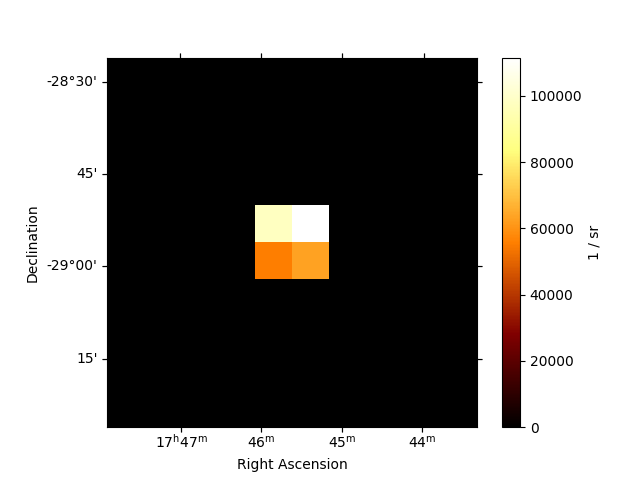Note
Click here to download the full example code or to run this example in your browser via Binder
Point spatial model#
This model is a delta function centered in lon_0 and lat_0 parameters provided:
\[\phi(lon, lat) = \delta{(lon - lon_0, lat - lat_0)}\]
The model is defined on the celestial sphere in the coordinate frame provided by the user.
If the point source is not centered on a pixel, the flux is re-distributed across 4 neighbouring pixels. This ensured that the center of mass position is conserved.
Example plot#
Here is an example plot of the model:
from astropy.coordinates import SkyCoord
from gammapy.maps import WcsGeom
from gammapy.modeling.models import (
Models,
PointSpatialModel,
PowerLawSpectralModel,
SkyModel,
)
model = PointSpatialModel(
lon_0="0.01 deg",
lat_0="0.01 deg",
frame="galactic",
)
geom = WcsGeom.create(
skydir=SkyCoord("0d 0d", frame="galactic"), width=(1, 1), binsz=0.1
)
model.plot(geom=geom, add_cbar=True)

<WCSAxesSubplot: >
YAML representation#
Here is an example YAML file using the model:
pwl = PowerLawSpectralModel()
point = PointSpatialModel()
model = SkyModel(spectral_model=pwl, spatial_model=point, name="pwl-point-model")
models = Models([model])
print(models.to_yaml())
components:
- name: pwl-point-model
type: SkyModel
spectral:
type: PowerLawSpectralModel
parameters:
- name: index
value: 2.0
- name: amplitude
value: 1.0e-12
unit: cm-2 s-1 TeV-1
- name: reference
value: 1.0
unit: TeV
spatial:
type: PointSpatialModel
frame: icrs
parameters:
- name: lon_0
value: 0.0
unit: deg
- name: lat_0
value: 0.0
unit: deg